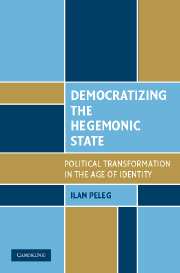Book contents
- Frontmatter
- Contents
- Preface
- Introduction
- 1 Ethnonational Conflict in Multinational Polities
- 2 The Crucial Triangle: Democracy, Statehood, and Hegemony in Multinational Settings
- 3 Classifying Multinational States
- 4 Transforming Uni-national Hegemony in Divided Societies: The Gradual Option
- 5 Transforming Uni-national Hegemony: Megaconstitutional Engineering
- 6 The Reverse Trend: Sustaining or Strengthening Ethnic Hegemony
- 7 Beyond Hegemony in Deeply Divided Societies: Transforming Hegemonic Systems
- References
- Index
3 - Classifying Multinational States
Published online by Cambridge University Press: 27 October 2009
- Frontmatter
- Contents
- Preface
- Introduction
- 1 Ethnonational Conflict in Multinational Polities
- 2 The Crucial Triangle: Democracy, Statehood, and Hegemony in Multinational Settings
- 3 Classifying Multinational States
- 4 Transforming Uni-national Hegemony in Divided Societies: The Gradual Option
- 5 Transforming Uni-national Hegemony: Megaconstitutional Engineering
- 6 The Reverse Trend: Sustaining or Strengthening Ethnic Hegemony
- 7 Beyond Hegemony in Deeply Divided Societies: Transforming Hegemonic Systems
- References
- Index
Summary
Peace is not the absence of conflict but the presence of creative alternatives to conflict, alternatives to passive or aggressive responses, alternatives to violence.
(Dorothy Thompson, 1893–1961, an American journalist)This volume attempts to understand the process through which a hegemonic, ethnic state might become a more inclusive polity: it focuses on the transformation of Ethnic Constitutional Orders to regimes that meet more fully the requirements of contemporary democracy as described in Chapter 2. The hegemonic ethnic state, however, is not a separate planet unto its own. It is part of a larger galaxy of states that includes different types of political systems. To understand the very essence of the hegemonic ethnic state, its raison d'etre, and its typical behavior as a political actor, one must be able to compare it to other types of polities, both theoretically and empirically.
The function of this chapter is to offer a classificatory system, reflected graphically in Figure 1 that will enable us to systematically analyze hegemonic states and, more specifically, study their potential for transformation. The classificatory system could be looked upon as an analytical framework that includes both static and dynamic components. Although it statically identifies a series of alternative political systems in deeply divided societies (e.g., liberal democracy, federal state, or consociational government), it also identifies (dynamically) five modes of reaction adopted by states in deeply divided societies, trying to resolve the ethnic tensions within their existing political space (as well as two additional modes of reaction in which the ethnic hegemonic state tries to resolve its dilemmas in an external fashion).
- Type
- Chapter
- Information
- Democratizing the Hegemonic StatePolitical Transformation in the Age of Identity, pp. 78 - 104Publisher: Cambridge University PressPrint publication year: 2007
- 1
- Cited by



